We may not have the course you’re looking for. If you enquire or give us a call on +44 1344 203999 and speak to our training experts, we may still be able to help with your training requirements.
Training Outcomes Within Your Budget!
We ensure quality, budget-alignment, and timely delivery by our expert instructors.

In Business-to-Business (B2B) interactions, B2B Business Development Strategies shine as a guiding light. Through this blog, we delve into the innovative approaches that steer B2B growth. From traditional networking to data-driven decision-making, we explore strategies that fortify relationships, fuel partnerships, and foster success.
B2B Business Development Strategies aid in generating long-term value for a company via partnerships, markets, and customers. Let's examine the benefits of B2B Business Development Strategies.
Table of Contents
1) Understanding B2B Business Development
2) Traditional B2B Business Development Strategies
3) Modernising B2B Business Development
4) Innovative Approaches to B2B Business Development
5) Challenges and How to Overcome Them
6) The Future of B2B Business Development
7) Conclusion
Understanding B2B Business Development
Business-to-Business (B2B) business development is a multifaceted process that involves the strategic identification, cultivation, and conversion of potential clients or partners within the business realm. Unlike Business-to-Consumer (B2C) interactions, where the focus is on individual consumers, B2B transactions revolve around forging relationships and delivering solutions tailored to the unique needs and complexities of businesses.
At its core, B2B business development is about creating value-driven connections that drive mutual growth. This involves understanding the intricacies of the target market, comprehending the challenges and goals of potential partners, and aligning one's offerings to meet those specific requirements.
The goal of B2B business development is not merely a one-time transaction but rather the establishment of long-term, symbiotic relationships that yield lasting value.
Ready to elevate your leadership skills? Explore our comprehensive Leadership Training courses
Traditional B2B Business Development Strategies
An integral component of B2B business development is networking. In-person interactions provide a level of personal connection that can be challenging to replicate through virtual means. Attending industry-specific events, conferences, and seminars allows professionals to meet potential clients, partners, and industry peers face-to-face.
Building a robust network involves active listening, engaging in meaningful conversations, and understanding the needs and pain points of other businesses. This insight can lead to the identification of opportunities for collaboration or partnerships that may not have been apparent through remote interactions.
Trade shows and industry events provide a stage for business to showcase their products, services, and expertise to a targeted audience. These events draw professionals and decision-makers from within a specific sector, creating a unique platform to interact with potential clients on a personal level.
Participating in trade shows allows businesses to set up booths, conduct product demonstrations, and engage in one-on-one conversations with attendees. Direct engagement fosters trust and credibility, as attendees can experience the offerings firsthand and have their questions answered in real-time.
Furthermore, trade shows provide insights into market trends and competitor activities. By observing the competition and gaining an understanding of industry developments, businesses can refine their offerings and strategies to stay competitive.
While it may be considered a more traditional approach, cold calling and direct outreach can still yield positive results when executed effectively. The key is to conduct thorough research before making contact. Identify the key decision-makers within the target organisation, comprehend their challenges and requirements, and customise your communication to effectively address those needs.
Cold calling is more than just making random calls; it involves a strategic approach that aims to establish relevance and value. W In your outreach efforts, concentrate on demonstrating how your product or service can resolve a specific problem or improve the functioning of the prospect's business. Be prepared to articulate a clear value proposition that resonates with their objectives.
To make this strategy more effective, consider supplementing cold calling with personalised emails and providing additional information that demonstrates your understanding of their needs. While technology has transformed the way we communicate, the human touch of a well-crafted conversation can still make a significant impact.
Ready to take the next step in your leadership journey? Discover the Introduction to Business Development Training course and equip yourself with the skills to drive growth and innovation.
Modernising B2B Business Development
B2B business development strategies have undergone a significant transformation. Digital tools and platforms have opened new avenues for connecting with potential clients, sharing information, and building relationships. Adopting these technological advancements is crucial for maintaining competitiveness in the rapidly evolving business landscape of today.

Leveraging social media for B2B Growth
Social media platforms now play a more expansive role, going beyond just being spaces for individual networking. They have emerged as powerful tools for B2B interactions, allowing companies to connect, engage, and build relationships with potential clients and partners on a global scale.
LinkedIn has become a cornerstone for B2B professionals. Creating and curating content that showcases industry expertise, thought leadership and innovative solutions can position a company as a trusted authority within its field. Engaging in meaningful discussions, sharing valuable insights, and participating in industry groups can help establish connections that may evolve into valuable partnerships.
Twitter, on the other hand, enables businesses to stay up to date with industry trends, engage in real-time conversations, and demonstrate agility in responding to market changes. By leveraging hashtags and participating in relevant conversations, companies can amplify their brand visibility and establish a digital presence that resonates with potential B2B partners.
Content marketing and thought leadership
Content marketing has become a powerful instrument for generating B2B leads and fostering relationship building in the business sphere. Creating high-quality content which addresses the pain points, challenges, and opportunities within a specific industry can position a company as a thought leader and problem solver.
Blogs, whitepapers, webinars, and e-books provide platforms for sharing valuable insights and showcasing expertise. This content not only educates and informs potential clients but also nurtures their trust in the company's capabilities. It demonstrates a commitment to adding value beyond the transaction, fostering long-term relationships based on mutual growth.
Search Engine Optimisation (SEO) for B2B visibility
In a digital domain, search engines are the primary gateway to information, and effective SEO strategies are essential for ensuring that a company's offerings are discoverable by potential B2B clients. A well-optimised website, rich in relevant keywords, meta descriptions, and authoritative backlinks, increases the chances of appearing at the top of results pages.
By aligning SEO efforts with a deep understanding of target audience needs and behaviours, companies can attract organic traffic from individuals actively seeking solutions in their industry. This positions the company as a go-to resource and increases the likelihood of engaging with qualified leads.
Innovative approaches to B2B Business Development
B2B business development strategies are no exception to this rule. As technologies advance, markets shift, and customer expectations change, staying ahead of the curve requires embracing innovative approaches that leverage cutting-edge tools and techniques.
Account-Based Marketing (ABM)
ABM is a focused strategy that concentrates on customising marketing initiatives to meet the unique requirements of key accounts. Unlike traditional mass marketing, ABM involves identifying high-value prospects and creating personalised campaigns that resonate with their individual pain points and objectives.
ABM strategies often involve a deep understanding of the target account's organisational structure, decision-makers, and challenges. By crafting messages that address the unique needs of each account, companies can foster stronger relationships and position themselves as partners invested in the success of their clients.
AI and predictive analytics
Artificial Intelligence (AI) and predictive analytics have revolutionised the way companies approach B2B business development. These technologies enable businesses to analyse data and identify patterns, and potential opportunities.
Predictive analytics can help prioritise leads by analysing historical data to determine the likelihood of conversion. By focusing efforts on leads with the highest probability of success, companies can optimise their resources and increase conversion rates. AI-driven tools can also provide insights into customer behaviour and create personalised interactions with customers.
Data-driven insights for strategic decision-making
Innovative B2B business development relies heavily on data-driven decision-making. The abundance of data available through digital interactions, CRM systems, and online analytics tools provides a wealth of insights that can guide strategy development.
Analysing data can uncover trends, customer preferences, and gaps in the market. For example, identifying the most common pain points among potential clients can inform the creation of targeted solutions. Through continuous monitoring and analysis of data, companies can refine their approach, adapt to changing market dynamics, and optimise their strategies for success.
Challenges and how to overcome them
While B2B business development offers promising opportunities for growth and partnership, it also presents a set of unique challenges that must be navigated effectively. Understanding these challenges and having a proactive approach to overcoming them can make the difference between success and stagnation.
Long sales cycles and complex decision-making
B2B sales cycles are longer and more intricate compared to B2C transactions. The decision-making process often involves multiple stakeholders, each with their own priorities, requirements, and concerns. This complexity can lead to delays and uncertainty.
Solution: To address this challenge, focus on building relationships with all relevant stakeholders. Provide personalised information and tailored solutions that address the concerns of each party. The process requires clear and transparent communication throughout. Anticipate potential roadblocks and offer insights to mitigate concerns. By nurturing relationships and maintaining consistent communication, you can navigate through the extended sales cycle with confidence.
Building trust in B2B relationships
Trust is the foundation of successful B2B relationships. Establishing trust requires demonstrating reliability, consistency, and a commitment to delivering on promises. Building trust can be especially challenging when dealing with new clients or partners.
Solution: Transparency and authenticity are key. Be upfront about your capabilities and limitations. Provide case studies, references, and testimonials to showcase your track record. Additionally, consider offering trial periods or pilot projects to showcase the value of your offerings. By delivering on expectations and consistently exceeding them, one can build a strong foundation of trust that leads to long-term partnerships.
Cultural sensitivity in international markets
Expanding into international markets brings the challenge of navigating cultural differences and nuances. What works in one market may not resonate in another, and missteps can lead to misunderstandings or failed partnerships.
Solution: Thoroughly research the cultural norms, values, and communication styles of the target market. Consider partnering with local experts or hiring professionals who understand the cultural landscape. Personalise your messaging and approach to align with the preferences of the local audience. Demonstrating cultural sensitivity shows respect and increases your chances of making a positive impression.
The future of B2B Business Development

Artificial Intelligence (AI) and automation are assured to play a transformative role in B2B business development. These technologies can simplify the processes to streamline processes, enhance customer experiences, and enable data-driven decision-making.
AI-powered chatbots can provide instant responses to inquiries, improving customer engagement and satisfaction. Automation can handle routine tasks, allowing sales teams to focus on high-value activities like relationship-building and strategy development. Predictive analytics will become even more sophisticated, enabling companies to anticipate customer needs and preferences with precision.
The future of B2B relationship building will be marked by deeper personalisation and stronger partnerships. As data analytics continue to refine customer insights, companies will be able to tailor their interactions with unprecedented precision.
The rise of ABM will lead to highly customised campaigns that resonate with individual stakeholders within target accounts. Companies will invest in relationship-building initiatives that extend beyond the initial sale, focusing on providing ongoing value and support to clients throughout their journey.
With increased reliance on data and technology, ethical considerations will gain prominence in B2B business development. Companies will need to prioritise data privacy and security and to establish trust with the clients.
Ethical considerations will extend beyond data to encompass broader issues such as sustainable business practices and social responsibility. Demonstrating a commitment to ethical behaviour and aligning with clients who share these values will become a competitive advantage.

Conclusion
As technology reshapes industries and customer expectations evolve, staying competitive necessitates strategic evolution. From traditional networking to cutting-edge AI integration, B2B Business Development Strategies underscore the pivotal role of dynamic strategies. Navigating challenges with trust, personalisation, and ethical considerations reinforces lasting partnerships.
As we gaze into the future, B2B Business Development Strategies remain a compass guiding businesses toward prosperous B2B interactions. By embracing change, staying agile, and aligning with emerging trends, businesses can navigate the evolving landscape and pave the path to successful B2B growth.
Frequently Asked Questions
Upcoming Business Skills Resources Batches & Dates
Date
 Design Thinking Course
Design Thinking Course
Fri 10th Jan 2025
Fri 14th Feb 2025
Fri 11th Apr 2025
Fri 13th Jun 2025
Fri 8th Aug 2025
Fri 26th Sep 2025
Fri 21st Nov 2025







 Top Rated Course
Top Rated Course


 If you wish to make any changes to your course, please
If you wish to make any changes to your course, please


